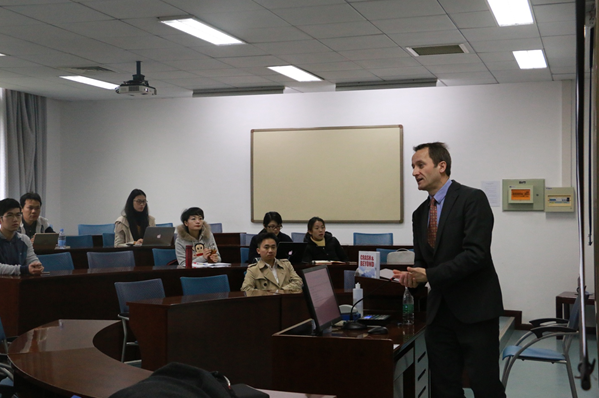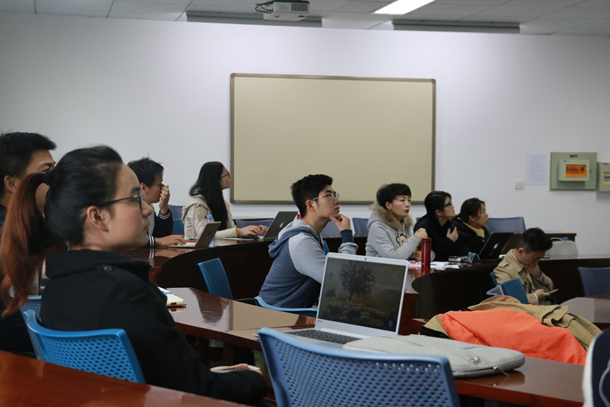Prof. Farlow, senior research fellow of economics at Oriel College, Oxford University delivered an in-depth lecture on the topic “the Euro crisis: is there any escape?” at the Economics and Management School of Wuhan University. His works on global health, pharmaceutical research, financial markets, monetary policy and bubbles are particularly noteworthy. He also introduced his book “Crash and Beyond: Causes and Consequences of the Global Financial Crisis” which explores the financial and economic downturn, its roots, risk management, housing and debt from an economic standpoint.
He started his lecture with the benefits of the Eurozone: a better chance for economic growth owing to factors like a single market, tariff-free trade, lower consumer prices, free movement of workers, investments and economies of scale. In the meanwhile, the Eurozone countries cannot devalue and carry out self-fulfilling speculative attacks against weak currencies as they are all inside of a common currency. The countries in the European Union have improved inflation performance and discipline on costs, hence, preventing any sort of reputational effect. From the view of the Global Competitiveness Index, Greece got itself into trouble by diverging from country competitiveness or in other words, by being less competitive. He also diagrammatically showed the mismatch between Greece’s government payment and receipts and Greece also had the highest government debt as a percentage of GDP which undermined the confidence of the entire banking system, not just the investors.

Prof. Farlow delivering his lecture
However, for a while the Eurozone crash occurred without any prior warning and all those factors that were once considered the Eurozone’s strengths now became its vulnerabilities. The countries in the EU cannot devalue, and also cannot use quantitative easing (QE) to push interest rates down thus raising the fears of contagion across borders. The no bail-out clause of the Lisbon Treaty prevented the transfer from surplus to deficit nations but if it were to devalue internally and default, the scenario would intensify.
The Eurozone crash was also a banking crash: Germany trade surplus just about matched the combined trade deficits of countries in the Euro periphery and France, and Germany and the UK were also exposed to the Greek debt in both private landing and government debt exposure. When the economy was shrinking, the interest rates shot up and non-performing loans (NPL) in the corporate, mortgage and consumer markets went from around 5 billion to 50 billion. He explained the reason behind this phenomenon, “If you are on your own as a corporate firm having problems while nobody else is having problems, the creditors will come down on you very tough but many firms are suffering and many firms are having problems paying back their corporate loans, it’s quite a sensible thing as an individual firm to not repay because nobody else is repaying.”
In 2009, Greek banks were holding €56 billion of Greek government debt. During that time, the EU had no institution in place to handle such a major refinancing except EMU. But now, official creditors and all the stakeholders introduced the newly-invented ESFM (European Financial Stability Mechanism), EFSF (European Financial Stability Facility), SSM (a bank resolution mechanism), and ESM (a financial stability mechanism). But the major fault is that these financing schemes can’t rescue large countries from the financial meltdown. These financial support measures were targeted for better a business environment with financial stability and tax reform in Greece. But the lack of focus, continuing political instability, poor business climate, capital controls and endless political debate led the crisis to soar and jeopardize other large economies in the Eurozone.
France, Germany and UK were also exposed to the full-blown Greek default in both private landing and government debt exposure. But even Greece and other such countries like Portugal, Spain and Ireland had a silver lining as banks were willing to invest in the property market. About banks and financial institutions buying government debts, he said, “They are buying it because they think these countries have got good prospects. Actually, they are prepared to accept a fairly low rate of return in exchange for them to basically finance the deficit of these countries”. In the long run, they expect to have huge profitable claims against these countries.
Th currency crisis was gradually replaced by the sovereign debt crisis, one of the main reason behind frequent referendums in Greece. He said, “The official creditors who now bear all the debt, use Memorandum of Understanding (MoU) as a main tool for pushing and managing the Greek economy. The dilemma there is that if you want the Greek people to make decisions and to be responsible for their economy, one of the problems is that you will also be coming in from above and dictating how their economy should be run.”
In average general government balance, Ireland and Spain faced no fiscal problems other than overextended banks and a property bubble, but Portugal and Greece faced twin deficits. Portugal, Ireland and Cyprus had also received financial assistance in similar bail-in schemes for the restructuring of the banking sector after their banks went bust. He also talked about the moral hazards of large bail-outs and said, “If you always bail a bank out when it does something wrong then the next time around it’s not necessarily going to be careful because it knows it will be bailed out.”
Greece no longer has access to an international market under this new set of economic circumstances and he stated, “In 2010, it was relatively easy for the government of Greece to borrow from the international market. They were doing a lot of borrowing, then the crash happens and the international market doesn’t lend them anything.” “No one could have predicted the Eurozone crisis even after the global recession,” as he went on, “If you looked to the market for how much it had cost for Greece and Portugal to borrow, it was very cheap. In other words, we had the global financial crash and the Eurozone was still looking safe”
The ballooning government debt had large impacts on employment and real estate costs but the inflation was not largely affected. The debt was getting more expensive by the day and private sector bail-in would ensure panic. Transfer from large economies like Germany and France to an insolvent country would breach the Lisbon Treaty and Greece was not in any position to receive loans with high interest rates. The transfer would also be politically unmanageable because the countries have to convince its voters first. Bigger rescue funds could collapse other economies and the resulting austerity condition could negatively impact the bond market. There is however a huge political incentive to procrastinate: do nothing and let the problem persist.

Students attending the lecture
As the study shows, the extra GDP required for primary surplus is too huge and there is still a high chance of default even when deficits are under control. He explained, “If you imagine a situation where every year they have to actually consume less than what they produce so they can produce a little bit to pay off the debt. What you are basically saying is the government has to run some kind of surplus in its account. It turns out that it will take a long time.” The Eurozone could also follow German strategy of alleingang and write down the debts in spite of the $120-$180 billion loss on a 1/3-1/2 write-down, and recapitalize the Greek banks.
Total bank exposure to the public sector debt and the banks of Greece, Portugal and Ireland is at an estimated $360 billion dollars and if the Eurozone is to turn the tide against the looming crisis, it has to act and intervene immediately and effectively.
Mr. Farlow’s unparalleled knowledge in this issue helped the attending students develop a crystal-clear idea of the on-going Euro crash which has spread its ripples farther afield and he humbly cleared all their doubts in the following open discussion.
Photo by Shi Weimin
Edited by Sun Jingyi, Edmund Wai Man Lai & Hu Sijia